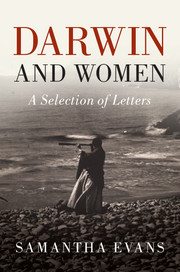Book contents
- Frontmatter
- Contents
- List of illustrations
- Foreword
- Preface
- Acknowledgments
- Symbols, abbreviations, and conventions
- 1 Friends
- 2 Marriage
- 3 Children
- 4 Scientific wives and allies
- 5 Observing plants
- 6 Companion animals
- 7 Insects and angels
- 8 Observing humans
- 9 Editors
- 10 Writers and critics
- 11 Religion
- 12 Travellers
- 13 Servants and governesses
- 14 Ascent of woman
- List of letters and provenances
- Biographical notes
- Bibliography and further reading
- Index
4 - Scientific wives and allies
Published online by Cambridge University Press: 16 February 2017
- Frontmatter
- Contents
- List of illustrations
- Foreword
- Preface
- Acknowledgments
- Symbols, abbreviations, and conventions
- 1 Friends
- 2 Marriage
- 3 Children
- 4 Scientific wives and allies
- 5 Observing plants
- 6 Companion animals
- 7 Insects and angels
- 8 Observing humans
- 9 Editors
- 10 Writers and critics
- 11 Religion
- 12 Travellers
- 13 Servants and governesses
- 14 Ascent of woman
- List of letters and provenances
- Biographical notes
- Bibliography and further reading
- Index
Summary
When Darwin made notes in 1838 about what he intended to do with the rest of his life, the question of whether or not to marry was a critical one. ‘If not marry’, he mused, ‘Travel. Europe, yes? America????’. ‘If marry’, he continued, further down the page, ‘means limited, Feel duty to work for money. London life, nothing but Society, no country, no tours, no large Zoolog. Collect. no books.’ On another sheet, he wrote with qualified optimism of the advantages of marriage: ‘Constant companion, (& friend in old age) who will feel interested in one,— object to be beloved & played with.— —better than a dog anyhow’, while still noting the ‘terrible loss of time’. On the side of the single life, he wrote, ‘Freedom to go where one liked— choice of Society & little of it.— Conversation of clever men at clubs— Not forced to visit relatives, & to bend in every trifle.— to have the expense & anxiety of children— perhaps quarelling— Loss of time.’ The risk that marriage would distract him from his scientific interests seems to have been uppermost in his mind, but at some point a sort of emotional spasm occurred: ‘My God, it is intolerable to think of spending ones whole life, like a neuter bee, working, working, & nothing after all.— No, no won't do.— Imagine living all one's day solitarily in smoky dirty London House.— Only picture to yourself a nice soft wife on a sofa with good fire, & books & music perhaps’. (DAR 210.8: 1 and 2.)
Shortly after that, Darwin proposed to Emma Wedgwood and was accepted.
Darwin was right to see marriage and his future career as inextricably entangled, but seemed unaware that his family could be an asset rather than a liability, although that in fact was the case for him and was a fairly normal state of affairs among contemporaries of his own rank in life: unless of course he was joking. His notes on marriage seem bleakly comic. The Darwins and Wedgwoods were so steeped in Jane Austen that it's difficult to imagine Darwin writing them without an occasional wry smile at himself.
- Type
- Chapter
- Information
- Darwin and WomenA Selection of Letters, pp. 50 - 66Publisher: Cambridge University PressPrint publication year: 2017

